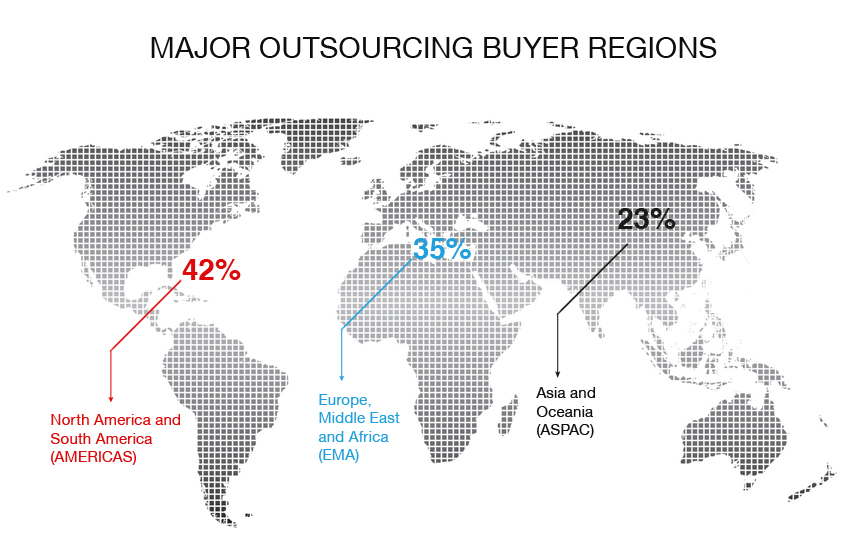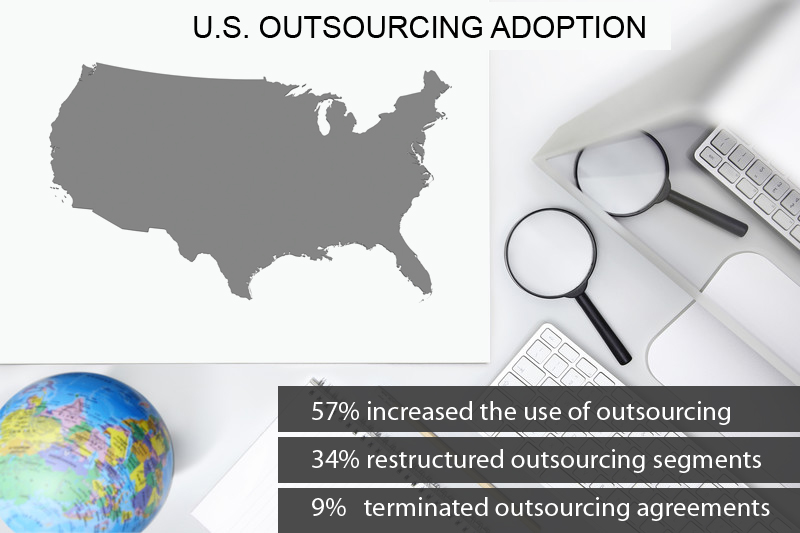 The present day business environment is consumer driven, and as a result business workloads have become very challenging to manage. Just as data entry services help streamline business data, IT outsourced solutions enable organizations to successfully meet emerging challenges such as the need for constant advancement and everyday management of the organization’s complex and resource-intensive IT operations. According to Deloitte’s 2016 Global Outsourcing Survey, 78 percent of businesses all over the world have a positive relationship with their outsourcing company. IT is one of the major outsourcing sectors within the global industry, and just as other business sectors, information technology outsourcing trend is predicted to increase over the next few years.
The present day business environment is consumer driven, and as a result business workloads have become very challenging to manage. Just as data entry services help streamline business data, IT outsourced solutions enable organizations to successfully meet emerging challenges such as the need for constant advancement and everyday management of the organization’s complex and resource-intensive IT operations. According to Deloitte’s 2016 Global Outsourcing Survey, 78 percent of businesses all over the world have a positive relationship with their outsourcing company. IT is one of the major outsourcing sectors within the global industry, and just as other business sectors, information technology outsourcing trend is predicted to increase over the next few years.
Before going on to the IT outsourcing trends for 2018, let us consider the outsourcing scenario in general.
Apart from IT, other sectors that utilize outsourced solutions include:
- Energy
- Healthcare and pharmaceuticals
- Defence and Government
- Travel and Transport
- Telecommunications
- Media
- Retail
Outsourcing is a popular choice for various industries as it helps to enhance the overall business processes and functions, and brings more revenue to the firm. Outsourcing is largely used all over the world and here is a representation of the major outsourcing buyer regions. The Americas emerge as the major buyers of outsourced services.
Now, here is a look at how the United States has adopted outsourcing. 57% has increased the use of outsourcing, 34% has restructured outsourcing segments, while only 9% has terminated outsourcing agreements.
IT Outsourcing Trends for 2018
Given that the outsourcing model is here to stay across various services and industries, let us focus on the IT outsourcing trends we can expect to see in the year 2018.
- Search for better partnerships: Today, companies need technical expertise not easily available in-house due to talent shortage, attrition, high cost, etc to carry out their day-to-day business operations. So they are in search of professional partners who understand their specific needs and can deliver timely services to solve the problems and achieve business goals. This requires unconventional outsourcing providers, or providers that invest with the client to build a team that acts as one and works together to achieve common objectives. Transparency and trust are indispensable in this new outsourcing model.
- Increased growth of emerging tech: Technological advancements like IoT (Internet of Things), Bitcoin, and Blockchain have become revolutionary innovations in the past few years. As businesses expand and compete in these tech spaces, the need for skilled professionals will also increase. This is one of the reasons for the increase in outsourcing. Other than IoT and blockchain, skilled professionals are needed to provide cloud-based solutions, and big data will continue to grow exponentially.
- Need for IT skills: From 2016, hiring skilled IT professionals has become increasingly difficult and this trend is expected to continue in 2018. This is because businesses are increasingly technology driven. One of the impacts of this trend is to drive companies to adopt outsourcing of additional IT roles earlier performed by internal staff. Heavy demand will arise for important skills such as open source, mobile and Microsoft software development skills from outsourcing firms. Organizations may find it more difficult to find programmers with specialized skills in emerging technologies. In addition, demand will increase for network resources and infrastructure services. Experts in the field believe that outsourcing is set to witness increased adoption rates from 2018 to 2019 on account of increased salaries and dearth of skill sets.
- More focus on value and less on cost: Businesses now attach priority to the value of the service being provided and not cost (which was the major consideration earlier). The market will see an increased interest in areas like productivity, quality and security. Today, customers are tech-savvy and aware of any failures associated with outsourcing. It is important therefore, to provide better value to the clients with transparency, and clients will be willing to spend more money for value-added services and high-quality service providers. You can expect to see a shift from “cost of service” to “value of service.”
- Increase in demand for “soft skills”: Alongside the demand for technical or “hard” skills, the demand for human or “soft” skills will also increase. Organizations will be looking for soft skills such as being a team player, excellent communication, knowing when to agree or disagree to something, when to assume a leadership position, and so on. The right combination of hard and soft skills is important for successful IT projects.
IT outsourced solutions can enhance your organization’s infrastructure, whether you want to complete a short-term, immediate technical project, or are looking for long-term trusted IT partner. A good service provider would make available certified technical and network support professionals, the resources and expertise to overcome any IT challenge your organization faces.





